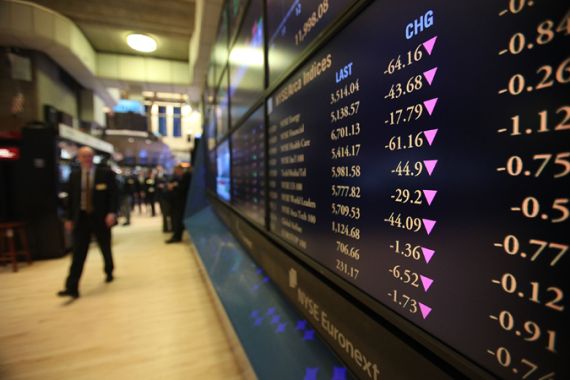Global markets shaken by Greek debt crisis
Shares around the world fall amid concerns over Greece’s escalating debt woes.

| Protesters clashed with riot police in central Athens during anti-austerity demonstrations [Al Jazeera] |
Stock markets around the world have fallen significantly amid fears over Greece’s escalating debt woes.
Shares were hard hit after thousands of protesters besieged the Greek parliament on Wednesday to protest against the latest wave of austerity cuts which are fundamental to Greece continuing to receive economic aid.
European shares fell on Thursday, with banking stocks under particular pressure, over fears of contagion.
The falls followed losses in Japan, where the market closed down 1.5 per cent.
Eurozone finance ministers meeting in Brussels on Tuesday failed to agree on how to involve private investors in the latest rescue package for Greece, with a solution seen about a month away. Fresh talks have been called for Sunday.
Greece has warned it will be unable to pay next month’s bills without a $17bn loan instalment from the EU and the IMF, part of a broader $159bn bailout package agreed last year
The latest protests, coupled with uncertainty over a second bailout for Athens and fears of contagion pushed the bond yields of Greece, Ireland and Portugal to euro lifetime highs.
The BBC reported that a leaked account of a meeting between EU commissioners on Wednesday suggested that the commissioners have a “profound sense of foreboding” about Greece and the future of the eurozone.
The account, written by an official who attended the meeting, said this was in reaction to the “damning failure” of eurozone ministers to agree a new bailout for Greece on Wednesday.
The author cautioned that the markets would now “smell blood”.
New government
Creditors have warned there will be no more financial aid without firm reform commitments from Athens.
George Papandreou, the Greek prime minister, said in a televised address on Wednesday that he would form a new government on Thursday and seek a vote of confidence from his PASOK parliamentary group.
His announcement came shortly after the opposition turned down his offer to stand down to facilitate the formation of a unity government for passing tough austerity measures.
“I will continue on the same course. This is the road of duty, together with PASOK’s parliamentary group, its
members, and the Greek people,” Papandreou said.
“Tomorrow I will form a new government, and then I will ask for a vote of confidence.”
He had earlier said the proposed new unity government must support the European Union and International Monetary Fund (IMF) bailout, and should not seek to overhaul it.
But opposition conservatives insisted a unity government was only possible if the bailout was renegotiated.
Greek opposition leader Antonis Samaras called for early elections after talks to form the unity government failed.
“It is clear that the only one who can deliver a solution now is the Greek people,” Samaras said in a televised statement on Wednesday.
Street clashes
The day’s political developments came as the government debated fresh austerity measures that would extend beyond its term in office amid violence on the streets of capital.
Protesters rallied outside parliament chanting “thieves, traitors” and asked “where did the money go?” as they demonstrated amid a 24-hour national strike organised by major labour unions which saw hospitals, transport and other public services crippled.
Small groups of youths threw stones and petrol bombs at police cordons, and smashed the windows of a luxury hotel on Syntagma square, outside the parliament building.
Police responded to the violence with tear gas.
“I feel rage and disgust,” Maria Georgila, a 45-year old public sector workers and mother of two, told the Reuters news agency.
“These are very tough measures and they won’t get us out of the crisis. I can’t believe they have no alternative.”
Alan Fisher, Al Jazeera’s correspondent in Athens, said: “There is undoubtedly anger on the streets … we’ve also seen people wearing entirely black, putting on masks and goggles.”
According to police, 20,000 people turned out for the demonstration, organised by two major unions, although local media put the figure at 40,000.
Another 20,000 people demonstrated in Greece’s second city of Thessaloniki, authorities said.
Steep cuts
Greece has to pass a 2012-2015 austerity programme worth $40.5bn by June-end or face being cut off from rescue funding by European countries and the IMF.
The measures including a five-year campaign of tax hikes, spending cuts ans sell-offs of state property.
However some politicians in the governing party have publicly criticised the new cuts, with one of them defecting on Tuesday, reducing Papandreou’s parliamentary majority to five.
With its credit rating deep in junk status, Greece is being kept afloat by the $159bn EU-IMF rescue loan programme and will need additional support to cover financing gaps next year.
To meet its commitments, Papandreou’s Socialists abandoned a pledge not to impose new taxes and drew up a four-year privatisation programme worth $72bn.
This has fuelled ongoing protests against austerity by public utility employees and other affected groups.
US-based financial services company, Standard & Poor’s, slashed Greece’s rating to CCC on Monday, dropping it to the lowest of 131 states that have a sovereign debt rating.
This indicates that Greece’s creditors may have less chance than Pakistan, Ecuador or Jamaica of getting their money back.
This is a surprising low for Greece as the country still had a stellar A-rating despite a hefty debt burden in January 2009.